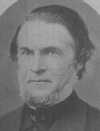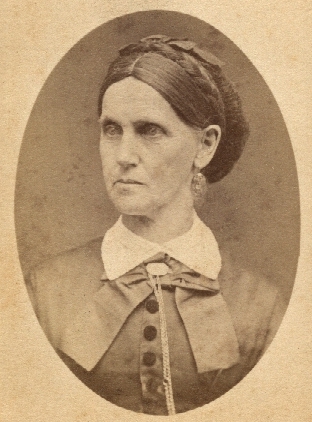
"Philo Belden, son of Jonathan and Love Dean Belden, was born in Canaan, Litchfield County, Connecticut, 22 October 1815; was baptized in October of 1816. He died in Racine County, Wisconsin 9 September 1889 and is buried in Rochester Cemetery, Rochester, Racine County, Wisconsin. The death certificate is dated 1 October 1889 and filed 5 November 1889 by J. G. Meacham, M.D. He was buried 11 September 1889 from St. Luke's Episcopal Church of Racine, Wisconsin."
He married on 6 June 1839 at La Porte, Indiana to Mary Frances Belden daughter of Henry Belden and Fanny Bennett. They had four children:
1) Henry Ward, born 9 November 1840, died 30 May 1915, he married Emily F. Brown
2)Edward J., born 17 July 1842, died 10 January in California, he married Nellie.
3) Albert O. born 16 March 1847, died about April 1918, he married Jennette Ormistrom
+4) Allen H., born in July of 1849, he first married Ella A. Robertson 3 July 1873 at Rochester, Wisconsin, was divorced, and married second Etta Burns 11 July 1893 at Racine.
"One of the obituaries appearing in Wisconsin State Necrology succinctly summed up his life 'Hon. Philo Belden died at Racine Sept. 9, 1889, age 74 years; born at Canaan, CT. Oct. 22, 1815, removed to Wisconsin 1837; Member of Assembly 1853, 1866, and 1868, and State Senator 1871-1872, County Judge from 1884-1889.'
"While the Canaan Church Records show his name as Jacob at time of baptism, members of the family had never heard the name nor saw it used by him; in searching for proof of all items concerning each ancestor, we found in the distribution of his father's estate, and land records in Falls Village, Connecticut, the name Philo, only given. we have felt that he was named Philo after his mother, Love, as the word Philo means love in the Greek language."
"Philo was educated in the public schools of his native town, supplemented by a course in The Academy at Litchfield, Connecticut. This may well have been the first law school in America established by Tapping Reeve, which building now houses the Historical Society of Litchfield."
"One of the key individuals associated with the early development of Rochester, and indeed of western Racine County in general, was Philo Belden, whose career illustrated the pioneering role of the enterprising Yankee. Born in Connecticut in 1815, he was the descendant of early seventeenth-century settlers from England. In 1835 he left Connecticut, traveling west to Michigan, where he bought two hundred acres. In the spring of 1826, however, he visited Racine County, including the village of Rochester. He decided to settle in Western Racine County and did so after selling his Michigan land late in 1837. In June, 1839, he married Mary Francis Belden of La Porte, Indiana, probably a cousin. After moving to Racine County, the couple raised a family of four sons.
"During his years in Racine County, from the late 1830s to his death in 1889, Philo Belden contributed to the area's development as farmer, businessman, politician, and judge. He invested in land in the western part of the County, some of which he sold and some of which he farmed. At the same time, he participated in the development and sale of town lots in Rochester as one of the proprietors of the village. To promote Rochester's growth, he established the dam, sawmill, flour mill, and an iron forge, and invested in other manufacturing projects. He was active also in promotion of the plank road from Racine through Rochester to the Rock River valley and in attempts to make the Fox River navigable for shipping.
"Philo Belden failed in his most ambitious venture--his effort to bring a railroad through Rochester. In 1855 he led in organizing the Fox River Valley Railroad, a company that attempted to establish a rail link from Milwaukee through Waterford, Rochester, and Burlington into Illinois. He won support from wealthy Milwaukee investors, and in January, 1861, the backers reorganized the project as the Milwaukee and Northern Illinois Railroad, with Belden as President. What attracted support was a scheme to run a line from Milwaukee southeast into Illinois with a connection to St. Louis, a more direct route than through Chicago. While the company did develop a right-of-way, it was never able to lay the line, and Philo Belden lost much of his modest fortune in the effort.
"Belden experienced more success as a political leader. Before the Civil War he became an advocate of reform causes which were then gaining popular support, and after the war he held office as an honored member of the Republican establishment. These aspects of his career reflect much of the County's political history in generations before and after 1860. In 1839 Democratic Territorial Governor Henry Dodge appointed Belden as Justice of the Peace for Racine County, and in 1842 Dodge's successor and opponent, James Duane Doty, allied to the Whig Party then in power in Washington, re-appointed "Squire" Belden. He won elections at various times to the position of Town Supervisor and to five terms on the County Board, serving as Chairman of that body in 1854. He was an anti-slavery, pro temperance advocate who ran for the State Assembly on the Whig ticket four times, winning only in 1852.
"With the eclipse of the Whig Party, and with the shift of reform minded individuals to the new Republican party, in the 1850s, Philo Belden became a Republican. He vigorously supported the Civil War and sent three sons to fight for the North. He won the western Racine County seat in the Assemblies of 1864 and 1866, and in 1870 he won election to the State Senate. Governor Jeremiah Rusk appointed him to fill a vacancy as County Judge of Racine County in 1884. Subsequently he won a full term. As judge he established the County's probate system and handled a variety of cases. He resigned in 1889, within a week of his death, and was succeeded by his grandson, Ellsworth Burnett Belden, who became one of Wisconsin's more distinguished jurists."
In the Racine County Atlas for 1887, the map of Rochester shows P. Belden on 60 acres at the south edge of the village on the east side of the Fox River.

